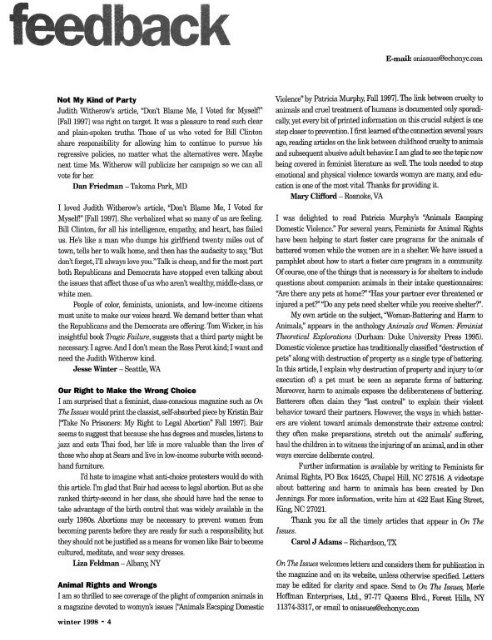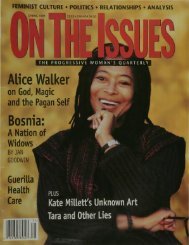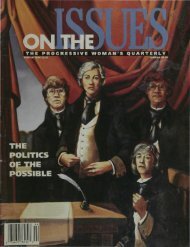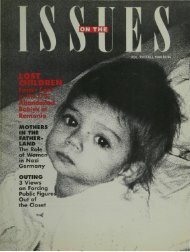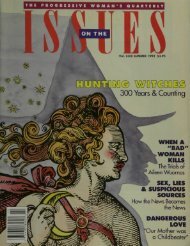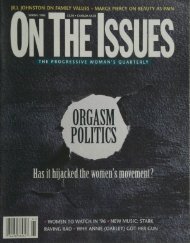women histories, incest sexual abuse. institutionalized. But what if ...
women histories, incest sexual abuse. institutionalized. But what if ...
women histories, incest sexual abuse. institutionalized. But what if ...
You also want an ePaper? Increase the reach of your titles
YUMPU automatically turns print PDFs into web optimized ePapers that Google loves.
feedback E-mail:<br />
Not My Kind of Party<br />
Judith WitheroVs article, "Don't Blame Me, I Voted for Myself!"<br />
[Fall 1997] was right on target. It was a pleasure to read such clear<br />
and plain-spoken truths. Those of us who voted for Bill Clinton<br />
share responsibility for allowing him to continue to pursue his<br />
regressive policies, no matter <strong>what</strong> the alternatives were. Maybe<br />
next time Ms. Witherow will publicize her campaign so we can all<br />
vote for her.<br />
Dan Friedman - Takoma Park, MD<br />
I loved Judith Witherow's article, "Don't Blame Me, I Voted for<br />
Myself." [Fall 1997]. She verbalized <strong>what</strong> so many of us are feeling.<br />
Bill Clinton, for all his intelligence, empathy, and heart, has failed<br />
us. He's like a man who dumps his girlfriend twenty miles out of<br />
town, tells her to walk home, and then has the audacity to say, "<strong>But</strong><br />
don't forget, I'll always love you."Talk is cheap, and for the most part<br />
both Republicans and Democrats have stopped even talking about<br />
the issues that affect those of us who aren't wealthy, middle-class, or<br />
white men.<br />
People of color, feminists, unionists, and low-income citizens<br />
must unite to make our voices heard. We demand better than <strong>what</strong><br />
the Republicans and the Democrats are offering. Tom Wicker, in his<br />
insightful book Tragic Failure, suggests that a third party might be<br />
necessary. I agree. And I don't mean the Ross Perot kind; I want and<br />
need the Judith Witherow kind.<br />
Jesse Winter - Seattle, WA<br />
Our Right to Make the Wrong Choice<br />
I am surprised that a feminist, class-conscious magazine such as On<br />
The Issues would print the classist, self-absorbed piece by Kristin Bair<br />
["Take No Prisoners: My Right to Legal Abortion" Fall 1997]. Bair<br />
seems to suggest that because she has degrees and muscles, listens to<br />
jazz and eats Thai food, her l<strong>if</strong>e is more valuable than the lives of<br />
those who shop at Sears and live in low-income suburbs with secondhand<br />
furniture.<br />
I'd hate to imagine <strong>what</strong> anti-choice protesters would do with<br />
this article. I'm glad that Bair had access to legal abortion. <strong>But</strong> as she<br />
ranked thirty-second in her class, she should have had the sense to<br />
take advantage of the birth control that was widely available in the<br />
early 1980s. Abortions may be necessary to prevent <strong>women</strong> from<br />
becoming parents before they are ready for such a responsibility, but<br />
they should not be just<strong>if</strong>ied as a means for <strong>women</strong> like Bair to become<br />
cultured, meditate, and wear sexy dresses.<br />
Liza Feldman - Albany, NY<br />
Animal Rights and Wrongs<br />
I am so thrilled to see coverage of the plight of companion animals in<br />
a magazine devoted to womyn's issues ["Animals Escaping Domestic<br />
winter 1998 - 4<br />
onissues@echonyc.com<br />
Violence" by Patricia Murphy, Fall 1997]. The link between cruelty to<br />
animals and cruel treatment of humans is documented only sporadically,<br />
yet every bit of printed information on this crucial subject is one<br />
step closer to prevention. I first learned of the connection several years<br />
ago, reading articles on the link between childhood cruelty to animals<br />
and subsequent abusive adult behavior. I am glad to see the topic now<br />
being covered in feminist literature as well. The tools needed to stop<br />
emotional and physical violence towards womyn are many, and education<br />
is one of the most vital. Thanks for providing it.<br />
Mary Cl<strong>if</strong>ford - Roanoke, VA<br />
I was delighted to read Patricia Murphy's "Animals Escaping<br />
Domestic Violence." For several years, Feminists for Animal Rights<br />
have been helping to start foster care programs for the animals of<br />
battered <strong>women</strong> while the <strong>women</strong> are in a shelter. We have issued a<br />
pamphlet about how to start a foster care program in a community<br />
Of course, one of the things that is necessary is for shelters to include<br />
questions about companion animals in their intake questionnaires:<br />
"Are there any pets at home?" "Has your partner ever threatened or<br />
injured a pet?" "Do any pets need shelter while you receive shelter?".<br />
My own article on the subject, "Woman-Battering and Harm to<br />
Animals," appears in the anthology Animals and Women: Feminist<br />
Theoretical Explorations (Durham: Duke University Press 1995).<br />
Domestic violence practice has traditionally class<strong>if</strong>ied "destruction of<br />
pets" along with destruction of property as a single type of battering.<br />
In this article, I explain why destruction of property and injury to (or<br />
execution of) a pet must be seen as separate forms of battering.<br />
Moreover, harm to animals exposes the deliberateness of battering.<br />
Batterers often claim they 'lost control" to explain their violent<br />
behavior toward their partners. However, the ways in which batterers<br />
are violent toward animals demonstrate their extreme control:<br />
they often make preparations, stretch out the animals' suffering,<br />
haul the children in to witness the injuring of an animal, and in other<br />
ways exercise deliberate control.<br />
Further information is available by writing to Feminists for<br />
Animal Rights, PO Box 16425, Chapel Hill, NC 27516. A videotape<br />
about battering and harm to animals has been created by Don<br />
Jennings. For more information, write him at 422 East King Street,<br />
King, NC 27021.<br />
Thank you for all the timely articles that appear in On The<br />
Issues.<br />
Carol J Adams - Richardson, TX<br />
On The Issues welcomes letters and considers them for publication in<br />
the magazine and on its website, unless otherwise spec<strong>if</strong>ied. Letters<br />
may be edited for clarity and space. Send to On The Issues, Merle<br />
Hoffman Enterprises, Ltd., 97-77 Queens Blvd., Forest Hills, NY<br />
11374-3317, or email to onissues@echonyc.com


